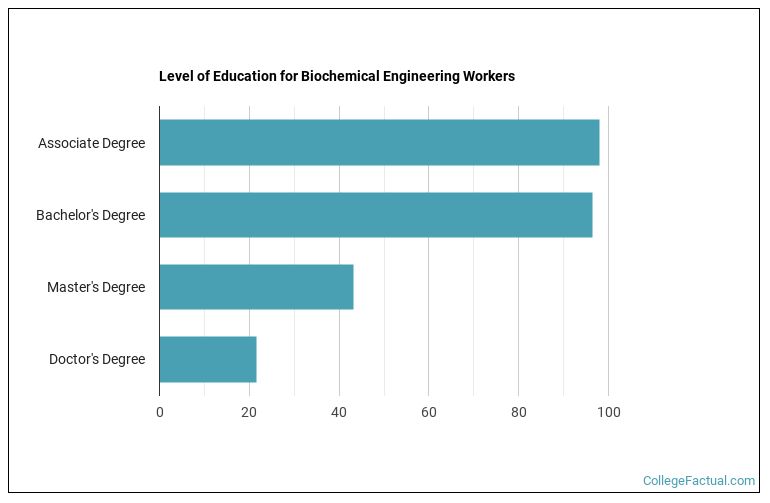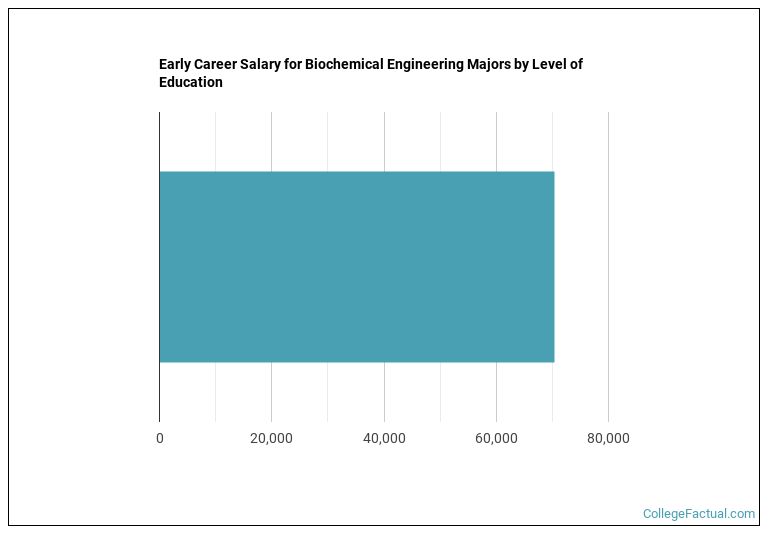 by our College Data Analytics Team
by our College Data Analytics TeamMedicine is constantly making new breakthroughs that cure diseases and save lives. If you are a scientific minded student who would like to contribute to the world of medicine, consider a major in Biochemical Engineering.
Biochemical Engineers work closely with cells, enzymes, and antibodies to collect data, explore medical possibilities, and solve biological issues. You will take classes in biology, chemistry, biotechnology, chemical engineering, computer programming, mathematics, and physiology to acquire the skills to copy cells, generate human organs and tissues, and develop systems to test new vaccines. A degree in biochemical engineering opens you up to a wide variety of careers in a rewarding field.
In 2021-2022, biochemical engineering was the 338th most popular major nationwide with 142 degrees awarded. This year's Best Biochemical Engineering Schools ranking compares 5 of them to identify the best overall programs in the country. Explore this or one of our many other custom biochemical engineering rankings further below.
Those who are interested in Biochemical Engineering should have a strong background in science, especially biology and chemistry. You should have strong math skills for conducting experiments and developing systems to analyze your research. Analytical and problem solving skills are also important as they help biochemical engineers analyze medical or biological issues and develop plans to remedy them.
Biochemical engineering professionals often work a typical 40-hour workweek. However, professionals may have to work longer hours when working to complete a project or meet a deadline. Work environment varies depending on the occupation. Some professionals work in a hospital, while others are located in laboratories or offices.
Although Biochemical Engineers may work in the field with their bachelor's degree, those who wish to advance in the field or participate in research and development will have to get either a master's degree or Ph.D.
New students will need to have completed high school or a GED program and each school will have their own minimum GPA and SAT/ACT test requirements. In addition to these basic biochemical engineering program qualifications, to serve in some biochemical engineering careers, special certification may be required outside of your degree.
Biochemical Engineering degree levels vary. You can spend many years getting as high as a in biochemical engineering to something that takes less time like a . Biochemical Engineering programs can take anywhere between one to four or more years for a full-time student to complete.
| Degree | Credit Requirements | Typical Program Length |
|---|---|---|
| Associate Degree | 60-70 credits | 2 years |
| Bachelor’s Degree | 120 credits | 4 years |
| Master’s Degree | 50-70 credits | 1-3 years |
| Doctorate | Program required coursework including thesis or dissertation | At least 4 years |
A bachelor's degree is the most common level of education achieved by those in careers related to biochemical engineering, with approximately 51.1% of workers getting one. People currently working in careers related to biochemical engineering tend obtained the following education levels.
| Level of Education | Percentage of Workers |
|---|---|
| Bachelor’s Degree | 54.7% |
| Master’s Degree | 20.8% |
| Doctoral Degree | 12.2% |
| Post-Baccalaureate Certificate | 3.2% |
| Post-Doctoral Training | 2.4% |
Most workers in biochemical engineering have at least a bachelor's degree. The chart below shows what degree level those who work in biochemical engineering have obtained.

The education level required is different depending on the biochemical engineering career you are seeking.
Biochemical Engineers work in a variety of locations. While a large portion of graduates work in the medical field either in hospitals or designing and develop medical equipment or supplies, other have gone into pharmaceuticals, scientific research, or work at colleges and universities.
The Biochemical Engineering field is growing at a very face rate, creating numerous job openings for recent graduates. As the generation ages, there is a higher demand for biomedical devices. The increased public awareness of medical advancements will also create a demand for more vaccines and cures, providing many job opportunities for those holding a degree in Biochemical Engineering.
Want a job when you graduate with your biochemical engineering degree? Biochemical Engineering careers are expected to grow 7.1% between 2016 and 2026.
The following options are some of the most in-demand careers related to biochemical engineering.
| Occupation Name | Projected Jobs | Expected Growth |
|---|---|---|
| Architectural and Engineering Managers | 190,000 | 5.5% |
| Engineers | 141,000 | 6.4% |
| Engineering Professors | 54,600 | 14.7% |
| Chemical Engineers | 35,100 | 7.3% |
Biochemical Engineering graduates between <nil> reported earning an average of $70,433 in the <nil> timeframe. Earnings can range from as low as $67,201 to as high as $70,668. As you might expect, salaries for biochemical engineering graduates vary depending on the level of education that was acquired.

Salaries for biochemical engineering graduates can vary widely by the occupation you choose as well. The following table shows the top highest paying careers biochemical engineering grads often go into.
| Occupation Name | Median Average Salary |
|---|---|
| Architectural and Engineering Managers | $148,970 |
| Chemical Engineers | $114,470 |
| Engineering Professors | $113,680 |
| Engineers | $99,410 |
With over 12 different biochemical engineering degree programs to choose from, finding the best fit for you can be a challenge. Fortunately you have come to the right place. We have analyzed all of these schools to come up with hundreds of unbiased biochemical engineering school rankings to help you with this.
Biochemical Engineering is one of 41 different types of Engineering programs to choose from.
| Major | Annual Graduates |
|---|---|
| Biochemical Engineering | 142 |
| Related Major | Annual Graduates |
|---|---|
| Mechanical Engineering | 44,794 |
| Electrical Engineering | 26,528 |
| Civil Engineering | 20,655 |
| Computer Engineering | 16,954 |
| Biomedical Engineering | 13,222 |
Image Credit: By UC Davis College of Engineering under License More about our data sources and methodologies.